As the effects of climate change become more evident, the question of where to live in a warming world becomes increasingly crucial. While some areas are expected to face severe challenges, others might emerge as new havens. These towns not only offer a potential refuge from rising temperatures and extreme weather but also present opportunities for growth and innovation. Whether it’s due to their geographic location, resilient infrastructure, or forward-thinking communities, these 13 American towns could be poised for a boom if the climate collapses.
1. Asheville, North Carolina
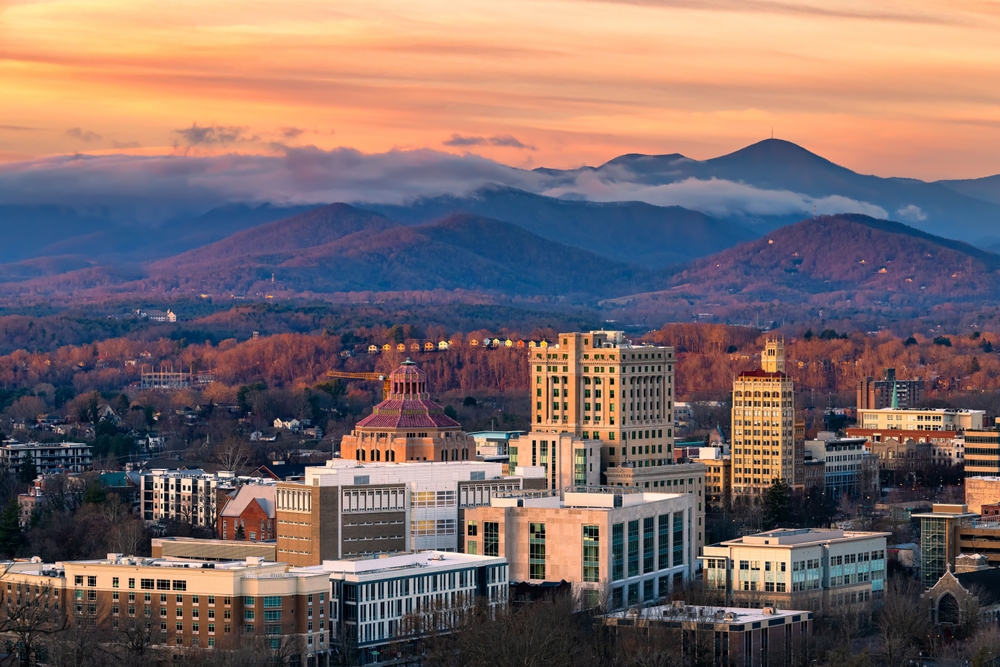
Nestled in the Blue Ridge Mountains, Asheville has long been known for its vibrant arts scene and natural beauty. But it’s the town’s higher elevation that may offer a significant advantage in a warming world. With temperatures rising more slowly than in other parts of the Southeast, Asheville could become a more attractive option for those seeking a temperate climate. In addition, the community has been proactive in implementing sustainable practices, which adds to its appeal.
According to a study published by the National Oceanic and Atmospheric Administration (NOAA), areas like Asheville with higher altitudes are less susceptible to the extreme heat waves that are expected to become more common. The town is also investing in renewable energy and green infrastructure, ensuring a more sustainable future. This focus on resilience makes Asheville not just a scenic escape but a forward-thinking community. As climate challenges mount, the town’s blend of natural and man-made assets could make it a haven for climate-conscious people.
2. Duluth, Minnesota

Sitting on the western tip of Lake Superior, Duluth might seem like an unlikely candidate for a boomtown, but it has some unique advantages. Its location near one of the largest freshwater sources in the world is increasingly valuable as water scarcity becomes a pressing issue. The town’s cooler climate can be a refuge as average global temperatures increase. Additionally, Duluth’s existing infrastructure is robust enough to handle a larger population.
Duluth has been steadily working on improvements that make it more appealing for future population growth. With initiatives focused on green energy and sustainable living, the town is setting itself up as a thoughtful community prepared for future challenges. Its emphasis on environmental stewardship resonates with people looking to escape to a place that prioritizes sustainability. If water remains a crucial resource, Duluth’s access to Lake Superior could make it an attractive choice for relocation.
3. Burlington, Vermont
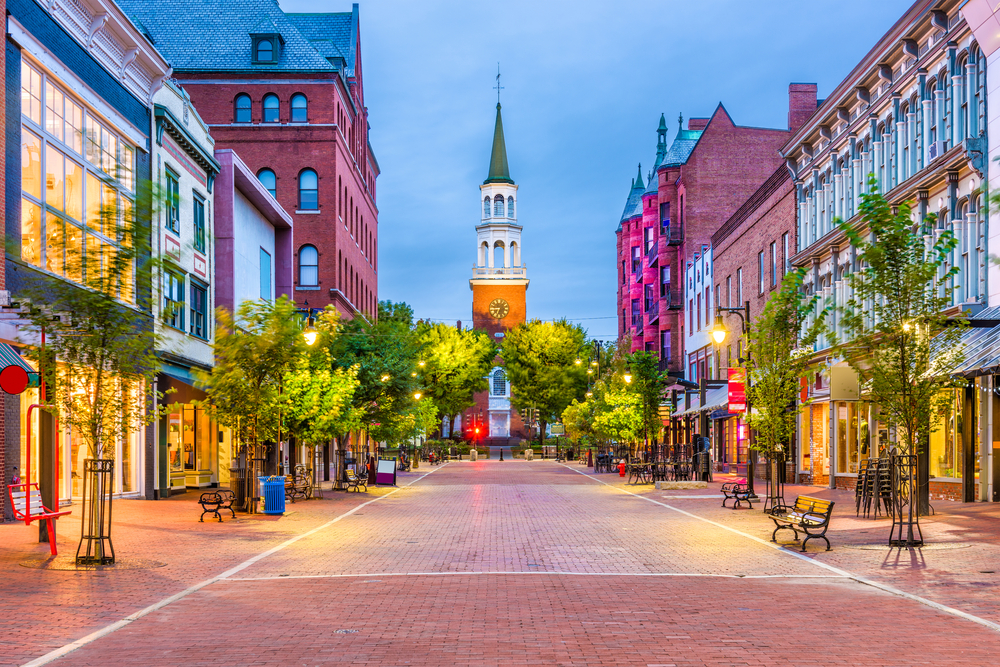
Burlington’s charm goes beyond its picturesque landscapes and vibrant culture. Its commitment to renewable energy and sustainability initiatives makes it a standout option in a changing climate. The town has already achieved a remarkable milestone—running entirely on renewable energy. This achievement underscores Burlington’s potential as a hub for those seeking a sustainable lifestyle in uncertain times.
Experts at the Intergovernmental Panel on Climate Change (IPCC) have identified the importance of transitioning to renewable energy as a means to combat climate woes. Burlington exemplifies this approach, with its energy policies serving as a model for other towns aiming to reduce their carbon footprint. Additionally, its location in the less hurricane-prone Northeast makes it more resilient to certain types of extreme weather. As climate concerns grow, Burlington offers a forward-thinking and stable option for relocation.
4. Boise, Idaho
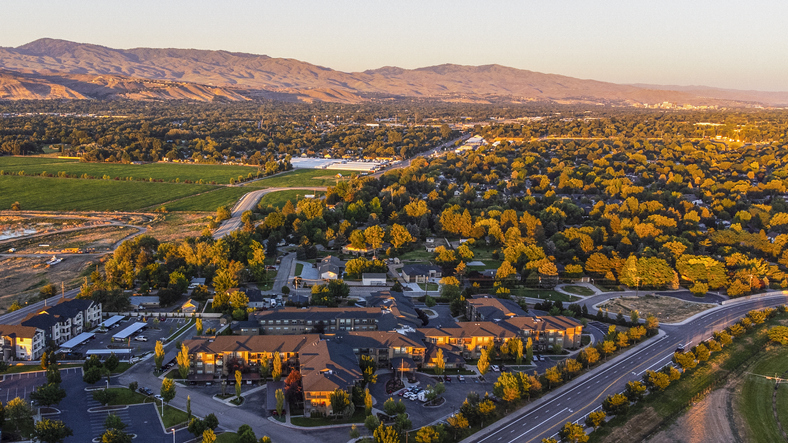
Boise’s geographic positioning and existing infrastructure make it a compelling choice for those looking to escape harsher climates. Nestled in a valley surrounded by mountains, it experiences a relatively mild climate compared to other parts of the West. The town has a growing tech industry, which not only attracts young professionals but also stimulates economic growth. These factors combined make Boise an increasingly attractive option for relocation.
The community in Boise has demonstrated a strong commitment to sustainability, with various initiatives aimed at reducing environmental impact. Efforts such as expanding public transportation and investing in renewable energy are paving the way for a more sustainable future. The town has shown resilience in the face of natural challenges, such as wildfires, by implementing effective mitigation strategies. As climate change continues to impact living conditions, Boise’s proactive approach makes it a promising choice.
5. Buffalo, New York

Buffalo’s resurgence is not just about its economic development but also its potential to thrive in a changing climate. Located on the shores of Lake Erie, it offers abundant freshwater resources—a critical asset in an increasingly water-scarce world. Buffalo’s climate is more temperate compared to many areas in the Northeast, which could be appealing as temperatures rise. The city’s efforts to revitalize its waterfront and improve urban infrastructure make it a potential hotspot for future growth.
According to a report by the Great Lakes Integrated Sciences and Assessments (GLISA), areas surrounding the Great Lakes, including Buffalo, may fare better in terms of climate resilience. The city’s commitment to revitalizing its urban areas and investing in sustainable practices aligns with this outlook. Buffalo is also diversifying its economy, creating new opportunities for residents and newcomers alike. With its ample resources and forward-thinking initiatives, Buffalo could become a key location for those seeking stability in an unstable climate.
6. Spokane, Washington
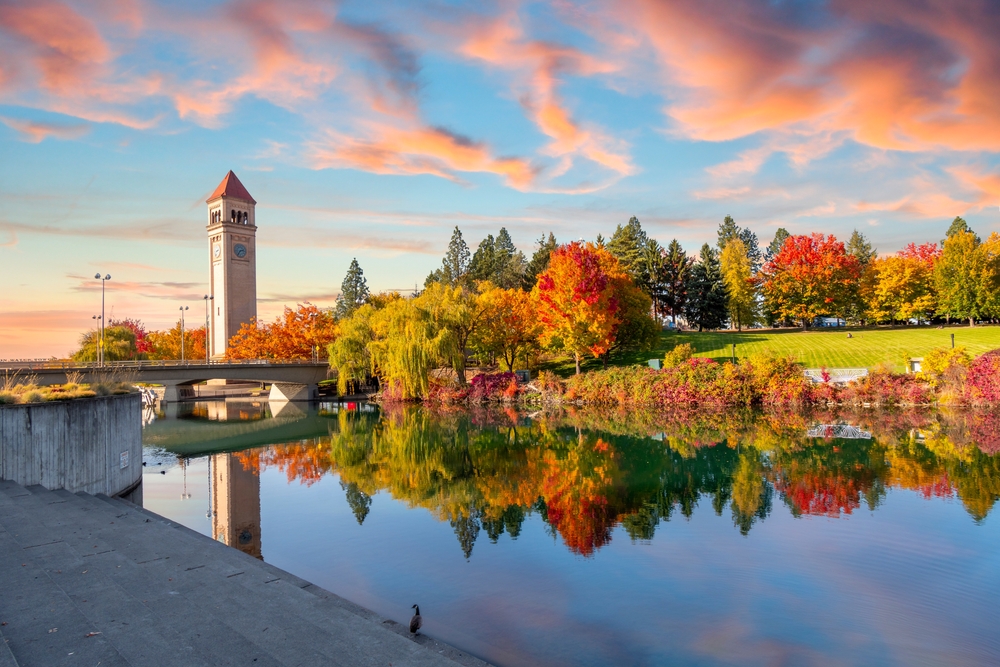
Spokane offers a blend of urban amenities and natural beauty, appealing to those looking for a balanced lifestyle. Its location in the Pacific Northwest provides it with a milder climate, which could be an asset as temperatures rise elsewhere. The city has made strides in environmental sustainability, focusing on clean energy and efficient waste management. Its proactive stance on climate issues makes it a promising option for future growth.
The local government has been actively working on improving infrastructure to accommodate a growing population, which has been attracted by the city’s quality of life. Spokane’s commitment to sustainable practices is evident in its community-driven initiatives and policies. The city is also investing in public transportation and green spaces, making it more appealing to environmentally-conscious residents. With these advantages, Spokane is setting itself up as a viable option for those considering relocation in the face of climate change.
7. Madison, Wisconsin
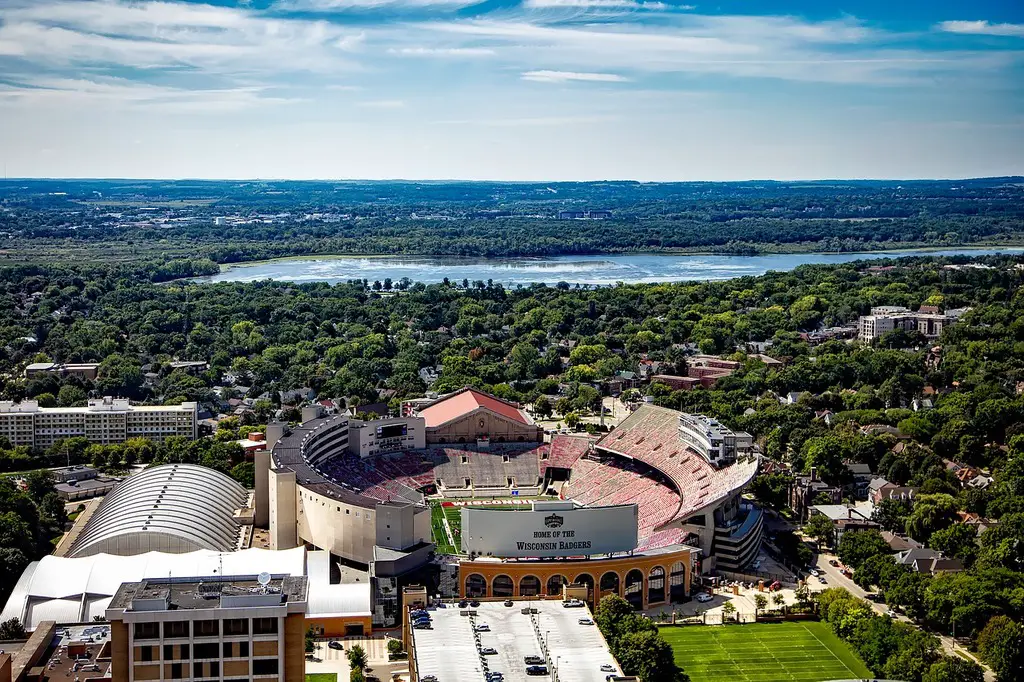
Madison’s status as a university town brings a unique blend of innovation and sustainability, making it well-equipped for challenges posed by climate change. The town has already made significant investments in renewable energy and conservation efforts. Its location in the Midwest, away from the coasts, offers some protection from extreme weather events such as hurricanes and rising sea levels. These factors combined make Madison a compelling choice for those seeking a stable and progressive community.
A study from the Center for Climate and Energy Solutions highlights the importance of regional energy independence and innovation as crucial for climate resilience. Madison’s focus on sustainable living, supported by its academic community, positions it strategically for future growth. The town has also embraced initiatives that encourage sustainable agriculture and local food production. As climate impacts intensify, Madison’s forward-thinking approach and central location could make it a desirable destination.
8. Ann Arbor, Michigan

Ann Arbor’s vibrant community and commitment to sustainability make it an attractive option for people looking to relocate. The city’s proximity to the Great Lakes provides a valuable freshwater resource, crucial in a warming world. Ann Arbor has made significant strides in renewable energy and green building practices, setting itself apart as a leader in sustainability. These initiatives not only reduce its carbon footprint but also make it a resilient choice for future growth.
Home to the University of Michigan, Ann Arbor benefits from a strong focus on research and innovation, particularly in environmental sciences. This academic influence fosters a culture of sustainability and forward-thinking in the community. The city’s active approach to addressing climate challenges through public policy and community engagement adds to its appeal. With these combined efforts, Ann Arbor is well-positioned to become a thriving hub in the face of a changing climate.
9. Portland, Maine
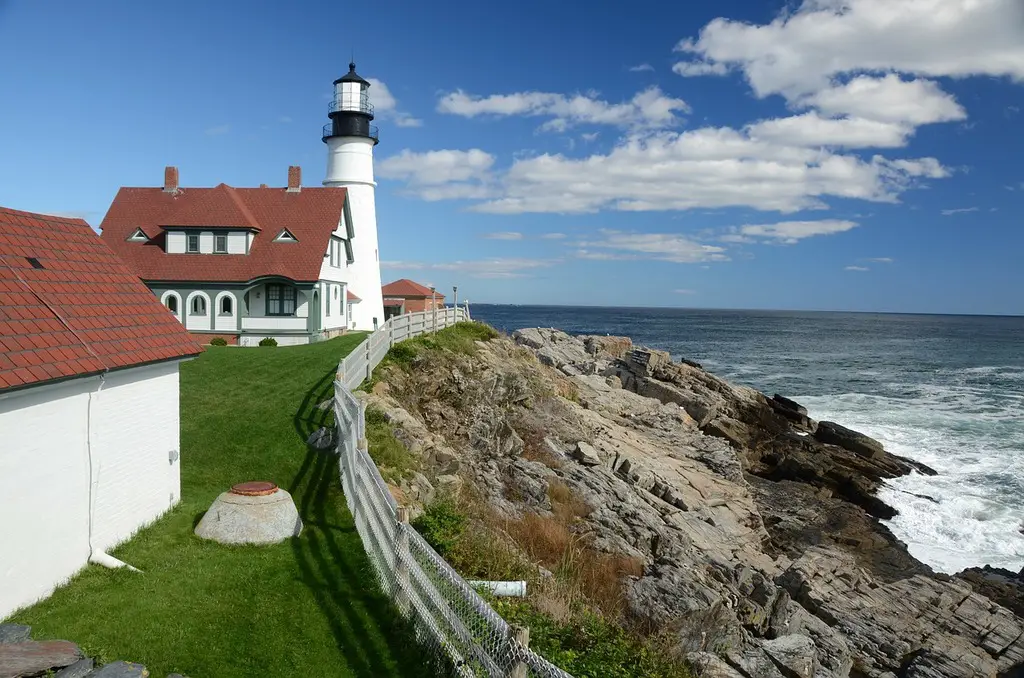
Portland’s coastal location and strong community focus on sustainability make it a standout choice for relocation. The town has been at the forefront of implementing green infrastructure and renewable energy initiatives. This commitment to sustainability is paired with a vibrant cultural scene, making Portland both a practical and enjoyable place to live. Its coastal resources and proximity to natural beauty offer additional appeal.
As climate change impacts coastal areas, Portland’s proactive measures to combat sea-level rise and preserve its natural resources are crucial. The town’s focus on community-driven solutions to environmental challenges strengthens its resilience. Portland is also investing in public transportation and walkability, enhancing quality of life for residents. With these strategies in place, Portland is poised to become a desirable destination for those seeking a sustainable and engaging lifestyle.
10. Santa Fe, New Mexico

Santa Fe’s unique blend of cultural heritage and commitment to environmental sustainability makes it an appealing option for climate-conscious people. Located in the high desert, it offers a dry, temperate climate that may become more attractive as other areas face increased humidity and heat. The town is known for its robust arts scene and vibrant community, adding to its allure. Santa Fe’s dedication to preserving its natural environment is evident in its green building practices and renewable energy efforts.
The community has embraced a sustainable lifestyle, focusing on conservation and energy efficiency. Santa Fe’s policies promoting solar energy and water conservation are particularly relevant in a changing climate. As a cultural and artistic hub, the town also offers a unique quality of life that appeals to diverse residents. With its environmental focus and cultural richness, Santa Fe is well-positioned to attract those seeking a stable, inspiring place to call home.
11. Burlington, Iowa

Burlington, Iowa, might not be the first town that comes to mind when considering climate resilience, but it offers some unique benefits. Its location along the Mississippi River could be advantageous for freshwater access, an increasingly important resource. Burlington has been investing in green spaces and infrastructure improvements, making it more appealing to potential newcomers. These efforts combined with a strong sense of community make it a town worth considering.
The town has made strides in enhancing livability through sustainable practices and community initiatives. Its investments in renewable energy and public infrastructure align with a forward-thinking approach to climate challenges. Burlington also benefits from a central location, offering a more stable climate away from coastal extremes. As people look for reliable places to settle, Burlington’s combination of resources and community spirit make it a compelling option.
12. Charleston, West Virginia

Charleston’s geographic location and proactive community initiatives make it a viable choice for dealing with climate change. Situated in the Appalachian Mountains, it offers a buffer from coastal storms and sea-level rise. The town has made noticeable efforts to improve its infrastructure and embrace renewable energy solutions. These improvements are geared towards enhancing resilience in the face of environmental challenges.
The community in Charleston is active in promoting sustainable practices, from public transportation initiatives to energy-efficient building standards. The town’s investment in green infrastructure is also evident, making it a more attractive place for those seeking sustainability. Charleston’s focus on innovation and community engagement enhances its appeal as a future climate refuge. With these factors in play, Charleston could become a thriving center for those looking to escape more vulnerable areas.
13. Rochester, New York

Rochester has long been a hub of innovation and education, making it well-equipped to face the uncertainties of climate change. Its location along Lake Ontario provides a crucial freshwater resource, an asset that cannot be overstated in a warming world. The town has been proactive in implementing renewable energy solutions and sustainable urban planning. These efforts are designed to create a more livable and resilient community.
Rochester’s emphasis on education and research, particularly in the environmental sciences, positions it as a leader in sustainability. The town’s initiatives to improve public transportation and reduce carbon emissions demonstrate a commitment to a greener future. With a vibrant arts and cultural scene, Rochester also offers a high quality of life that attracts diverse residents. As climate impacts intensify, Rochester’s blend of resources, innovation, and community spirit make it a promising choice for those seeking stability and opportunity.
